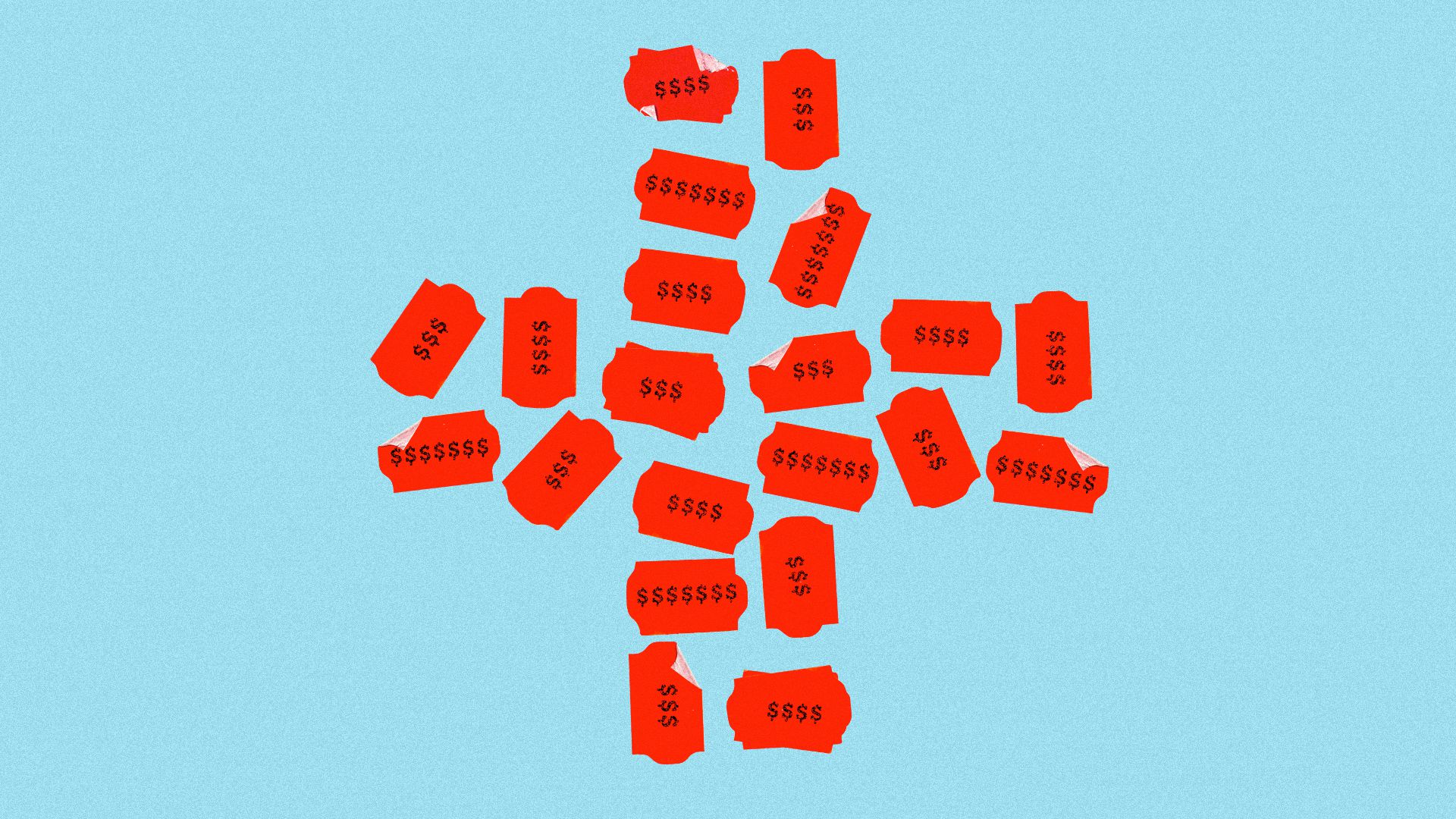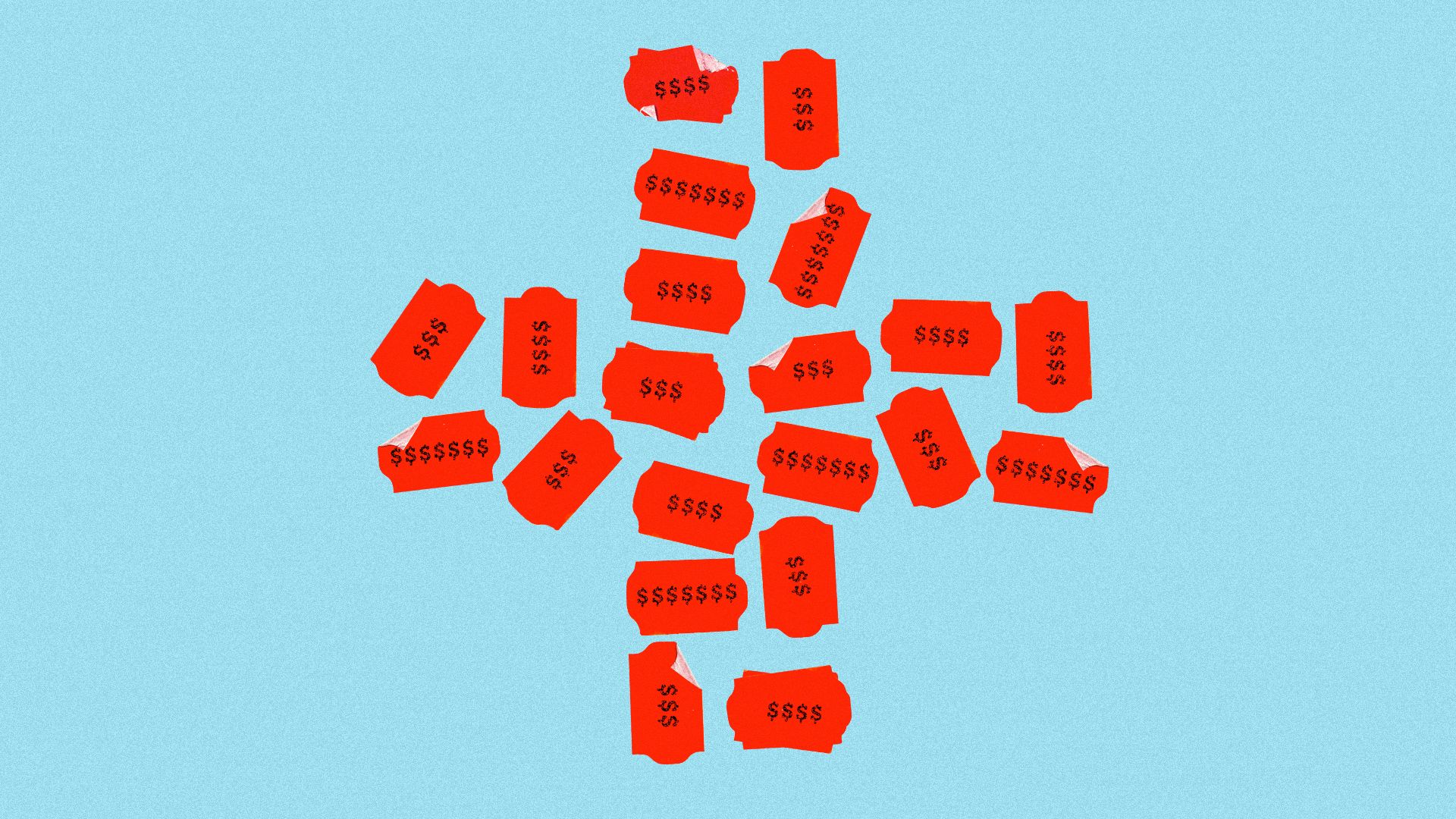1 big thing: Democrats double down on health care prices


Many 2020 Democrats' health care proposals feature aggressive price regulations, either as a feature or a byproduct — a sign the party has largely given up on the idea that competition alone can keep costs in check.
Between the lines: It's not just Democrats. As public outrage has grown over prescription drug prices and surprise medical bills, there's been bipartisan congressional interest in regulating prices.
"The two big trends are increasing out-of-pocket costs to consumers and increasing disparity between public and commercial rates — and therefore consumer and employer pushback on those dynamics — and policymakers are now attempting to respond."
The big picture: "Medicare for All" brings all provider and drug reimbursements under the federal government's control.
- Sen. Bernie Sanders has been elusive about what those rates would be, but Sen. Elizabeth Warren has proposed massive rate cuts to doctors and hospitals as a way to reduce her plan's cost.
Even the more moderate candidates' public-option plans would enroll more Americans in government health care plans that set rates. And some have pitched ideas like limiting how much providers can charge for out-of-network care.
- But supporters of a public option argue that it also enhances competition in the private insurance market, driving prices down across the board without completely abandoning the use of market forces.
All of the leading 2020 candidates have proposed drug policies, ranging from limiting how much drug companies can increase their prices to allowing the federal government to strip the patent from drugs that are deemed too expensive.
- Even President Trump has proposed limiting how much Medicare pays for certain drugs by tying the price to what other countries pay.
The other side: The industry hates all of these ideas.
2. Physician staffing firm suing patients
An emergency room staffing firm owned by TeamHealth has filed thousands of lawsuits against patients in Memphis in the last few years, ProPublica and MLK50 report.
This is a collision of two storylines: the aggressive billing practices of private equity-backed health care companies, and providers' decision to take patients to court to collect their medical debts.
- Media reports have, until now, mostly focused on hospitals' lawsuits, but ProPublica and MLK50's reporting suggest the practice could be more widespread.
Between the lines: TeamHealth has already been in hot water for its role in surprise billing.
- Emergency room physicians send patients surprise medical bills more often than other specialties, especially physicians employed by TeamHealth.
- These doctors then have leverage to obtain higher in-network payment rates, making the practice lucrative.
- The group is also one of the main funders of the dark-money group that has run millions in ads against what was Congress' leading solution to surprise medical bills.
- The company was acquired by the Blackstone Group in 2017.
By the numbers: The Memphis subsidiary Southeastern Emergency Physicians has filed more than 4,800 lawsuits against patients in Shelby County General Sessions Court since 2017, per ProPublica and MLK50.
- TeamHealth said last week, after receiving questions from reporters, that it will no longer sue patients and won't pursue the lawsuits it's already filed.
3. Safety problems in psychiatric hospitals
There have been almost 100 preventable deaths in California's psychiatric facilities over the last decade, the LA Times reports.
Why it matters: The investigation "marks the first public count of deaths at California’s mental health facilities and highlights breakdowns in care at these hospitals as well as the struggles of regulators to reduce the number of deaths," Soumya Karlamangla writes.
- The count includes deaths that state investigators determined were caused by hospital negligence or malpractice, suicides and homicides.
What they're saying: Experts told the Times that the number of inpatient deaths in California doesn't appear to be higher than national averages, but raises huge concerns about patient safety.
4. Smartphones not great for mental health
Roughly 25% of youths experience depression, anxiety, poor sleep and high stress due to "problematic smartphone use," according to new research published Friday in BMC Psychiatry.
Why it matters: The report says the ways young people use smartphones — which mimic behavioral addiction — could be more harmful for mental health than the phones themselves, Axios' Orion Rummler reports.
What they found: 17- to 19-year-olds are the most frequent sufferers of problematic smartphone use, as found by over a dozen studies cited in the report, and those users said that social networking was the most important part of using a smartphone.
- Loneliness and low self-esteem were also associated with addictive or problematic smartphone use.
5. While you were very-long-weekending...
- Blood-sugar monitors for patients with diabetes stopped sending important information over the weekend, the result of a technological problem, WSJ reports.
- A bipartisan prescription drug bill isn't moving anywhere fast in the Senate, Politico reports.
- A new Medicare payment policy for physical, occupational and speech therapy in nursing homes has led to some nursing home chains and rehab companies reducing the treatment they provide to patients, NYT reports.
 Pathways Drug Rehabilitation Luxury Addiction Treatment & Detox Center
Pathways Drug Rehabilitation Luxury Addiction Treatment & Detox Center


